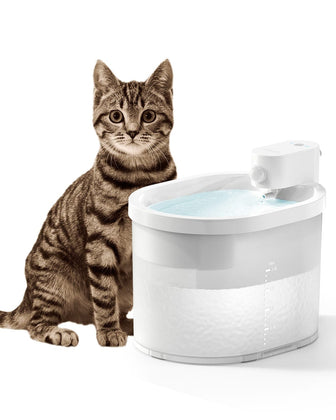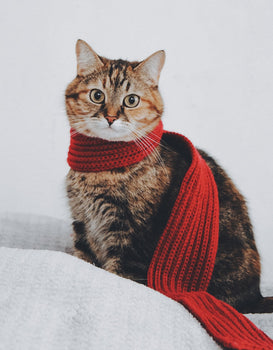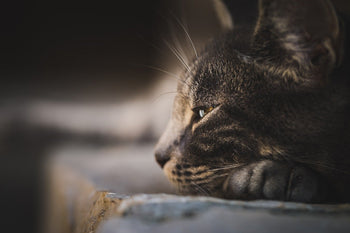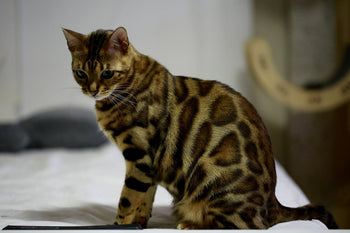Many cat owners love to share their food with their feline friends. While it may seem like a harmless way to bond with your cat, not all human foods are safe for them to eat. In fact, some can be toxic and even life-threatening to cats. This article will explore what human food cats can eat and what foods to avoid.
Section 1: Safe Human Foods for Cats Some human foods are safe for cats to eat in moderation. For example, cooked meats such as chicken and turkey are a great source of protein for cats. They can also eat small amounts of fruits and vegetables, such as blueberries, bananas, and cooked carrots. Additionally, some dairy products like plain yogurt and cheese are safe for cats to eat in small quantities.
Section 2: Foods to Avoid Feeding Cats There are several human foods that are toxic to cats and should be avoided at all costs. Chocolate, caffeine, and alcohol are just a few examples of foods that can be deadly to cats. Other foods like onions, garlic, and grapes can cause serious health problems such as anemia and kidney damage. It's important to keep these foods out of your cat's reach.
Section 3: Moderation is Key While some human foods are safe for cats to eat, it's important to remember that moderation is key. Too much of any food can upset your cat's stomach and cause digestive issues. It's also important to remember that cats have different nutritional needs than humans, and their diet should primarily consist of high-quality cat food.
What Human Food Can Cats Eat: A Comprehensive Guide
Key Takeaways
Some human foods are safe for cats to eat in moderation, such as cooked meats, fruits, and vegetables.
There are several human foods that are toxic to cats and should be avoided, including chocolate, onions, and grapes.
Moderation is key when feeding your cat human food, and their diet should primarily consist of high-quality cat food.

Section 1: Safe Human Foods for Cats
Cats are known to be picky eaters, but there are some human foods that they can safely consume. However, it is important to note that cats have different dietary requirements than humans, and some human foods can be harmful to them. Here are some safe human foods for cats:
Common Safe Foods
Cooked Meat: Cats are obligate carnivores and require meat in their diet. Cooked chicken, turkey, beef, and lamb are all safe options for cats. However, make sure to remove any bones, skin, and excess fat.
Fish: Fish is a good source of protein and omega-3 fatty acids, which are beneficial for cats. However, too much fish can cause thiamine deficiency in cats, so it should be given in moderation.
Eggs: Eggs are a good source of protein and can be given to cats as a treat. Make sure to cook the eggs thoroughly and remove the shell.
Vegetables: Some vegetables such as cooked carrots, green beans, and peas can be given to cats in small amounts. These vegetables are a good source of fiber and vitamins.
Nutritional Benefits
Including some human foods in a cat's diet can provide them with additional nutritional benefits. For example:
Cooked Meat: Meat is a good source of protein, which is essential for cats. It also provides them with essential amino acids that they cannot produce on their own.
Fish: Fish is a good source of omega-3 fatty acids, which can help improve a cat's skin and coat health. It also has anti-inflammatory properties that can help reduce inflammation in cats with arthritis.
Eggs: Eggs are a good source of protein and contain essential amino acids that cats need. They also contain vitamins such as vitamin A, which is good for a cat's vision.
Preparation and Serving Tips
When giving human foods to cats, it is important to prepare and serve them properly. Here are some tips:
Cooked Meat: Make sure to remove any bones, skin, and excess fat. Cut the meat into small pieces and serve it in moderation.
Fish: Only give fish in moderation and make sure it is cooked thoroughly. Avoid giving raw fish as it can contain parasites that can be harmful to cats.
Eggs: Cook the eggs thoroughly and remove the shell. Only give eggs as a treat and in moderation.
Vegetables: Cook the vegetables thoroughly and chop them into small pieces. Only give them in small amounts as cats do not require a lot of vegetables in their diet.
Overall, it is important to remember that human foods should not replace a cat's regular diet. Always consult with a veterinarian before giving any new foods to your cat.

Section 2: Foods to Avoid Feeding Cats
Cats are obligate carnivores, which means that they require a diet that is high in protein and low in carbohydrates. While some human foods can be safe for cats to eat in moderation, others can be harmful or even deadly. This section will discuss some of the human foods that cats should avoid.
Toxic Human Foods
Some human foods can be toxic to cats and should be avoided at all costs. These include:
Chocolate: Chocolate contains theobromine, which can cause vomiting, diarrhea, seizures, and even death in cats.
Onions and garlic: These foods can damage a cat's red blood cells and cause anemia.
Grapes and raisins: These foods can cause kidney failure in cats.
Avocado: The persin in avocado can cause vomiting and diarrhea in cats.
Alcohol: Even small amounts of alcohol can be toxic to cats and can cause vomiting, diarrhea, difficulty breathing, and even coma or death.
Health Risks
Some human foods can cause health problems for cats if they are fed too often or in large quantities. These include:
Dairy products: While cats may enjoy the taste of milk, cheese, and other dairy products, many cats are lactose intolerant and can experience digestive upset if they consume too much dairy.
Fatty foods: Foods that are high in fat, such as bacon, sausage, and fried foods, can cause digestive upset and even pancreatitis in cats.
Bones: Cooked bones can splinter and cause choking or internal injuries in cats.
Safe Alternatives
While some human foods can be harmful to cats, there are also many safe alternatives that cats can enjoy in moderation. These include:
Cooked lean meats: Cats can benefit from the protein and nutrients found in cooked lean meats such as chicken, turkey, and beef.
Cooked vegetables: Some cats enjoy vegetables such as green beans, peas, and carrots, which can provide additional nutrients and fiber to their diet.
Fruits: Small amounts of fruits such as apples, bananas, and berries can be a healthy treat for cats.
It is important to remember that while some human foods may be safe for cats to eat, they should always be fed in moderation and as part of a balanced diet. If you are unsure about whether a particular food is safe for your cat to eat, it is always best to consult with your veterinarian.
Section 3: Moderation is Key
Importance of Moderation
While there are many human foods that cats can safely eat, it is important to remember that moderation is key. Even foods that are safe for cats can cause health problems if they are consumed in excess.
Consequences of Overfeeding
Overfeeding your cat can lead to obesity, which can cause a variety of health problems such as diabetes, joint pain, and heart disease. It is important to monitor your cat's food intake and ensure they are getting the appropriate amount of nutrients for their size and activity level.
Feeding Guidelines
When feeding your cat human foods, it is important to follow some general guidelines to ensure their health and safety. Here are a few tips to keep in mind:
Introduce new foods gradually and in small amounts to avoid digestive issues.
Avoid giving your cat foods that are high in fat, sugar, or salt.
Always make sure that any food you give your cat is cooked and free from any harmful ingredients, such as onions or garlic.
Consult with your veterinarian before making any major changes to your cat's diet.
By following these guidelines and practicing moderation, you can safely incorporate human foods into your cat's diet and provide them with a variety of nutritious and tasty options.

Section 4: Consulting with a Veterinarian
Seeking Professional Advice
While it is helpful to research and educate oneself on the topic of human food for cats, it is always recommended to seek professional advice from a veterinarian. A veterinarian can provide personalized recommendations based on the specific needs and health conditions of the cat.
Benefits of Veterinary Consultation
Consulting with a veterinarian can provide several benefits. Firstly, a veterinarian can assess the cat's overall health and make recommendations based on their specific nutritional needs. Additionally, a veterinarian can provide guidance on portion sizes and feeding schedules to ensure the cat is receiving a balanced diet.
Scheduling a Consultation
To schedule a consultation with a veterinarian, cat owners can contact their local veterinary clinic. It is recommended to bring a list of questions and concerns to the appointment to ensure all topics are addressed. During the consultation, the veterinarian may also recommend a specific diet or brand of food that is appropriate for the cat's needs.
It is important to note that while consulting with a veterinarian is helpful, it does not replace the need for proper research and education on the topic of human food for cats. By combining both resources, cat owners can provide their feline companions with a healthy and balanced diet.
Conclusion
In conclusion, while cats are obligate carnivores and require a diet high in animal protein, it is possible to supplement their diet with certain human foods. However, it is important to keep in mind that cats have unique nutritional needs and not all human foods are safe for them to consume.
Some human foods that are safe for cats to eat in small amounts include cooked meat, fish, and poultry without bones or seasoning, as well as small amounts of fruits and vegetables such as blueberries, carrots, and green beans. It is important to note that these foods should not make up a significant portion of a cat's diet and should only be given as occasional treats.
On the other hand, there are many human foods that are toxic to cats and should be avoided at all costs. These include chocolate, caffeine, alcohol, onions, garlic, and grapes, among others. Ingestion of these foods can cause serious health problems for cats and can even be fatal.
In summary, while it is possible to offer cats some human foods as treats, it is important to do so in moderation and with caution. A well-balanced commercial cat food that meets all of a cat's nutritional needs should always be the primary source of their diet.
Frequently Asked Questions
Which human foods are safe for cats to consume daily?
Cats require a diet that is high in protein and low in carbohydrates. Some human foods that are safe for cats to consume daily include cooked meat, fish, and poultry. Additionally, some vegetables such as cooked carrots, green beans, and peas can be given to cats in small amounts.
What items from the human refrigerator can cats safely eat?
Cats can safely consume small amounts of cheese, yogurt, and milk. However, it is important to note that many cats are lactose intolerant and may experience digestive issues if they consume too much dairy. Other human foods that cats can safely eat from the refrigerator include cooked eggs, cooked fish, and cooked chicken.
Is it safe for cats to eat bread?
While bread is not toxic to cats, it is not a necessary part of their diet. Bread contains carbohydrates that cats do not require and can lead to weight gain and other health issues. It is best to avoid giving bread to cats.
What are some human foods that cats should never eat?
Some human foods that cats should never eat include chocolate, onions, garlic, grapes, and raisins. These foods can be toxic to cats and can cause serious health issues such as kidney failure and anemia.
Are eggs an appropriate food to give to cats?
Eggs are a good source of protein for cats and can be given to them in small amounts. Cooked eggs are safe for cats to consume, but it is important to avoid giving them raw eggs as they may contain harmful bacteria.
What are some human foods that cats typically enjoy?
Cats have individual preferences when it comes to food, but some human foods that cats typically enjoy include cooked chicken, cooked fish, and canned tuna. Additionally, some cats may enjoy small amounts of cooked vegetables such as green beans and peas. It is important to remember that these foods should only be given to cats in moderation as part of a balanced diet.

















